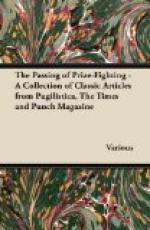I wonder why, whenever pressed
A little money to invest
In something which is quite the best
Affair to buy,
I always read next morning that
Not I, but it (in parlance pat
Of City articles) was “Flat,”
I wonder why.
* * * * *
CONTRIBUTION TOWARDS NURSERY RHYMES.
(FOR USE OF INFANT STUDENTS IN NEW SCHOOL OF DRAMATIC ART.)
’Tis the voice of the Prompter,
I hear him quite plain;
He has prompted me twice,
Let him prompt me again.
* * * * *
THE PRETTY SIMPLETON.
[The Spectator warns men against marrying simpletons, pointing out that “there is no bore on earth equal to the woman who can neither talk nor listen, and who has no mental interests in common with her husband.”]
[Illustration]
When fair BELINDA sweetly smiles,
And airily before you trips,
You’re captured by her artless wiles,
And must admire her rosy lips.
You know that she is very fair,
You see that she has splendid
eyes;
But ah, rash lover, have a care,
And find out if BELINDA’s
wise.
For beauty, trust us, is not all
A wife in these days should
possess;
Her conversation’s apt to pall,
If she can talk of naught
but dress.
She need not be too deeply read,
You do not want a priggish
bride;
But still take care the pretty head
Can boast some little brain
inside.
In courtship all she said was sweet,
For you had died to win a
glance;
Her little platitudes seemed neat,
Breathed ’mid the pauses
of the dance.
You would have felt a heartless fiend
To criticise, when by her
side;
Nor would the lady have demeaned
Herself to answer, had you
tried.
But when you’ve won her for a wife,
And ante-nuptial glamour dies,
What food for matrimonial strife
Her crass inconsequent replies.
How terrible to find her dense,
And never grasping what you
mean;
You’ll think one gleam of common
sense
Worth more than finest eyes
e’er seen.
Days come when love no longer gives
Illusions as in hours of yore;
And hapless is the man who lives
To find his wife become a
bore.
Then keep, if you’d avoid that day,
The wise Spectator’s
golden rule:
Don’t be by beauty led away,
And choose for wife a pretty
fool.
* * * * *
In the Times’ book advertisement column, the S.P.C.K. announces the following new publication:—
THE OUSE. By the Rev. A.J. FOSTER, M.A.
This, we suppose, is the first of a new unaspirated ARRY SERIES. The next Volume being The Ome, and, after that, Books of Ighgate, Amsted, Olloway, and other Ills.




